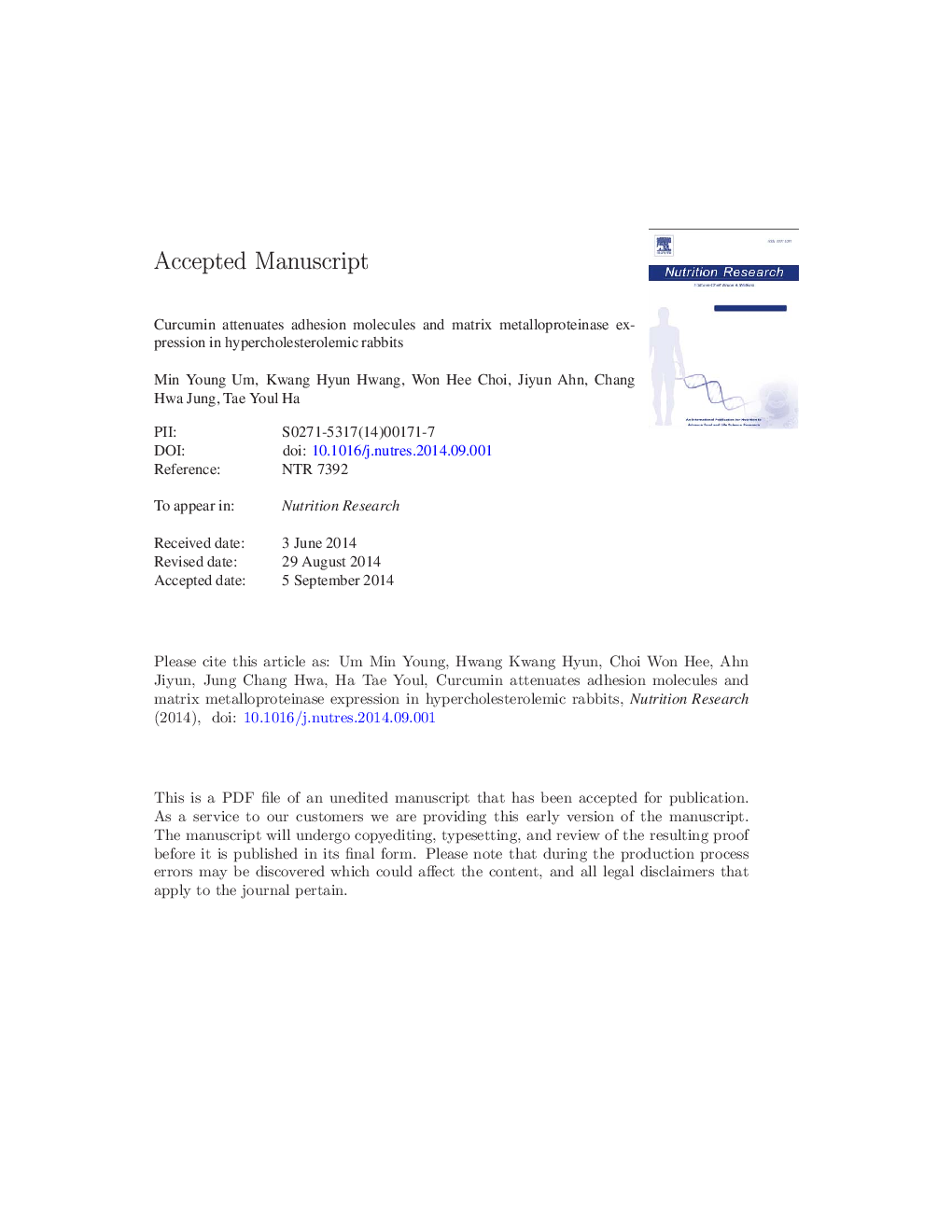| کد مقاله | کد نشریه | سال انتشار | مقاله انگلیسی | نسخه تمام متن |
|---|---|---|---|---|
| 5904375 | 1157982 | 2014 | 27 صفحه PDF | دانلود رایگان |
عنوان انگلیسی مقاله ISI
Curcumin attenuates adhesion molecules and matrix metalloproteinase expression in hypercholesterolemic rabbits
ترجمه فارسی عنوان
کرکومین باعث کاهش مولکولهای چسبندگی و ماتریکس فلپروتئیناز در خرگوشهای هیپرکلسترولمیک
دانلود مقاله + سفارش ترجمه
دانلود مقاله ISI انگلیسی
رایگان برای ایرانیان
کلمات کلیدی
CD36soluble intracellular adhesion molecule-1sICAM-1MMP-1oxLDLVCAM-1sVCAM-1HDL-CIL-1βLDL-CMMP-2MCP-1HCDMMP-9ICAM-1MmpsIL-6Atherosclerosis - آترواسکلروز(تصلب شریان)inflammation - التهاب( توروم) interleukin-6 - اینترلوکین ۶Interleukin-1β - اینترلوکین-1βTriglycerides - تریگلیسریدtumor necrosis factor-α - تومور نکروز عامل αRabbit - خرگوشcluster of differentiation 36 - خوشه تمایز 36High-cholesterol diet - رژیم غذایی با کلسترول بالاatherogenic index - شاخص آتروژنیکTNF-α - فاکتور نکروز توموری آلفاOxidized low-density lipoprotein - لیپوپروتئین با چگالی کم اکسید شدهhigh-density lipoprotein cholesterol - لیپوپروتئین پرچگالی یا اچدیالmatrix metalloproteinase - ماتریکس متالوپروتئینازMatrix metalloproteinase-9 - ماتریکس متالوپروتئیناز -9Matrix metalloproteinase-1 - ماتریکس متالوپروتئیناز-1Matrix metalloproteinase-2 - ماتریکس متالوپروتئیناز-2Matrix metalloproteinases - متالوپروتئیناز ماتریکسintercellular adhesion molecule-1 - مولکول چسبندگی بین سلولی -1Soluble vascular cell adhesion molecule-1 - مولکول چسبندگی سلولی عروقی حلقوی-1Adhesion molecules - مولکولهای چسبندگیMonocyte chemotactic protein-1 - پروتئین chemotactic monocyte-1C-reactive protein - پروتئین واکنشی سیCRP - پروتئین واکنشی سی یا سی. آر. پی Vascular cell adhesion protein-1 - پروتئین چسبندگی سلولی عروقی-1total cholesterol - کلسترول تامLow-density lipoprotein cholesterol - کلسترول لیپوپروتئین با چگالی کمCurcumin - کورکومین
موضوعات مرتبط
علوم زیستی و بیوفناوری
بیوشیمی، ژنتیک و زیست شناسی مولکولی
علوم غدد
چکیده انگلیسی
Curcumin, the yellow substance found in turmeric, possesses antioxidant, anti-inflammation, anticancer, and lipid-lowering properties. Because we hypothesized that curcumin could ameliorate the development of atherosclerosis, the present study focused on the effects and potential mechanisms of curcumin consumption on high-cholesterol diet-induced atherosclerosis in rabbits. During our study, New Zealand white rabbits were fed 1 of 3 experimental diets: a normal diet, a normal diet enriched with 1% cholesterol (HCD), or an HCD supplemented with 0.2% curcumin. At the end of 8 weeks, blood samples were collected to determine the levels of serum lipids, cytokines, and soluble adhesion molecule levels. Gene expression of adhesion molecules and matrix metalloproteinases (MMPs) in aortas were measured by quantitative real-time polymerase chain reaction and Western blot. Compared with the HCD group, rabbits fed an HCD supplemented with 0.2% curcumin had significantly less aortic lesion areas and neointima thickening. Curcumin reduced the levels of total cholesterol, triglyceride, low-density lipoprotein cholesterol, and oxidized low-density lipoprotein cholesterol in serum by 30.7%, 41.3%, 30.4%, and 66.9% (all P < .05), respectively, but did not affect high-density lipoprotein cholesterol levels. In addition, curcumin attenuated HCD-induced CD36 expression, circulating inflammatory cytokines, and soluble adhesive molecule levels. Curcumin reduced the mRNA and protein expression of intracellular adhesion molecule-1, vascular cell adhesion molecule-1, P-selectin, and monocyte chemotactic protein-1, and it inhibited HCD-induced up-regulation of MMP-1, MMP-2, and MMP-9. Our results demonstrate that curcumin exerts an antiatherosclerotic effect, which is mediated by multiple mechanisms that include lowering serum lipids and oxidized low-density lipoprotein, thus modulating the proinflammatory cytokine levels and altering adhesion molecules and MMP gene expression.
ناشر
Database: Elsevier - ScienceDirect (ساینس دایرکت)
Journal: Nutrition Research - Volume 34, Issue 10, October 2014, Pages 886-893
Journal: Nutrition Research - Volume 34, Issue 10, October 2014, Pages 886-893
نویسندگان
Min Young Um, Kwang Hyun Hwang, Won Hee Choi, Jiyun Ahn, Chang Hwa Jung, Tae Youl Ha,
